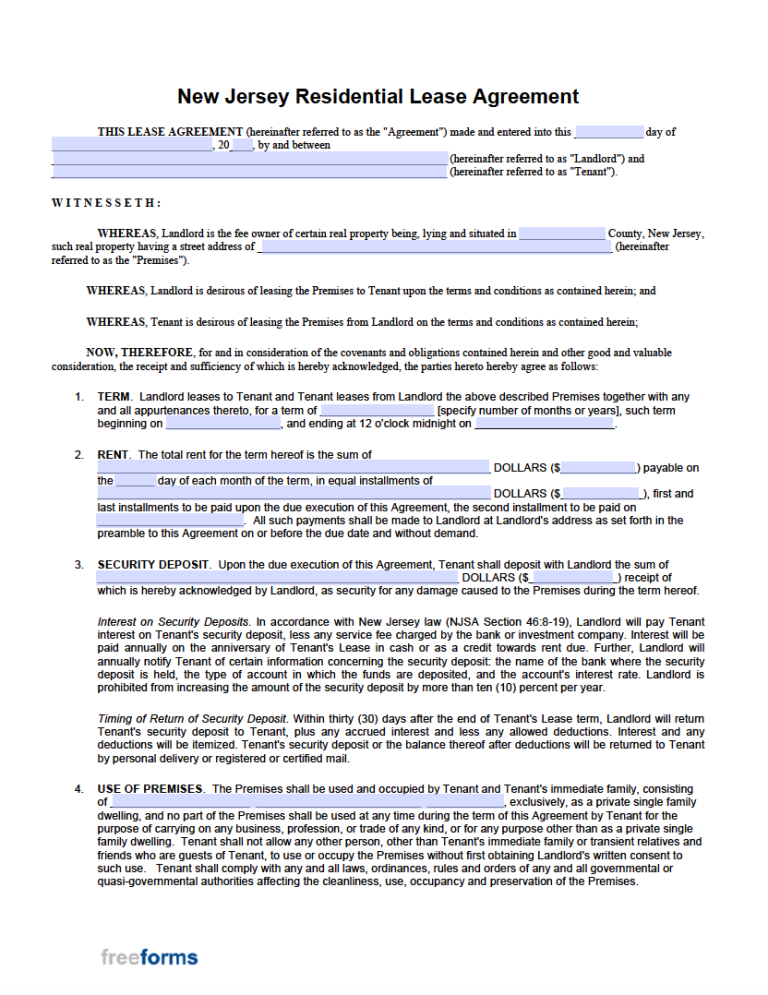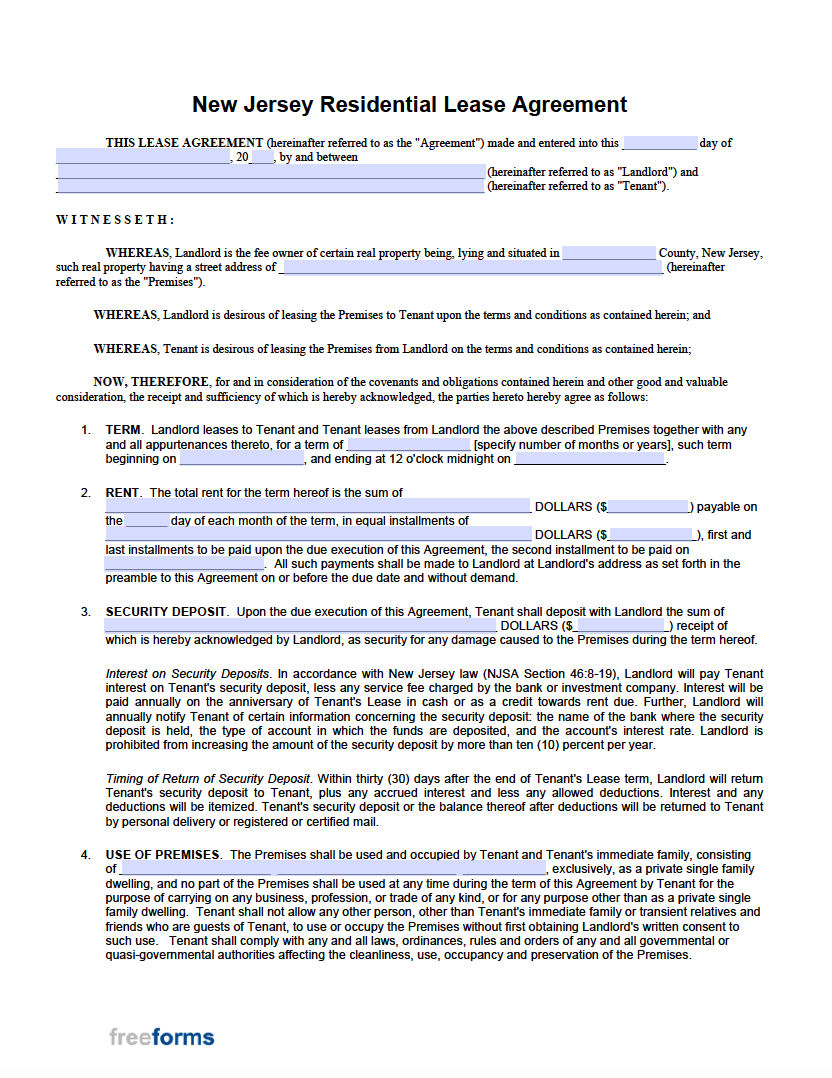Lease Agreements By Type (7)
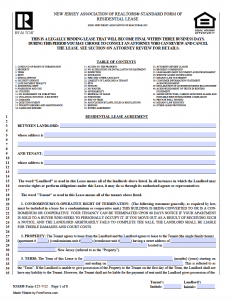 Association of Realtors Version: A New Jersey’s Realtor Group version of a residential lease agreement’s rental conditions and terms. Association of Realtors Version: A New Jersey’s Realtor Group version of a residential lease agreement’s rental conditions and terms.
Download: PDF |
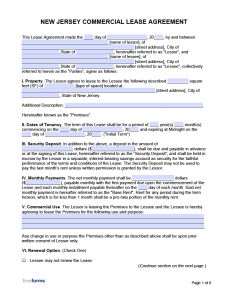 Commercial Lease Agreement: Conceives a detailed depiction involving the temporary use of real property by a company. Commercial Lease Agreement: Conceives a detailed depiction involving the temporary use of real property by a company.
Download: PDF, Word (.docx) |
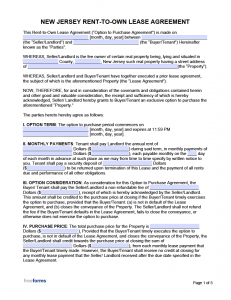 Lease to Own Agreement: Orchestrates a property’s rental conditions with an invitation to purchase once the lease term is up. Lease to Own Agreement: Orchestrates a property’s rental conditions with an invitation to purchase once the lease term is up.
Download: PDF, Word (.docx) |
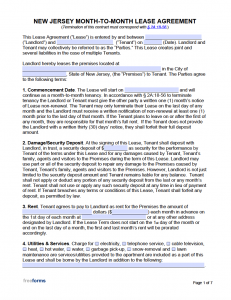 Month-to-Month Lease: Documents the lease provisions of a dwelling on a monthly basis while allowing 30 days’ notice for termination. Month-to-Month Lease: Documents the lease provisions of a dwelling on a monthly basis while allowing 30 days’ notice for termination.
Download: PDF, Word (.docx) |
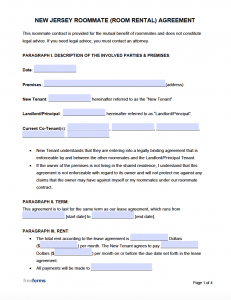 Roommate Agreement: Devises a standard lease, specifically for an individual to reside in a household with both shared and private space. Roommate Agreement: Devises a standard lease, specifically for an individual to reside in a household with both shared and private space.
Download: PDF, Word (.docx) |
Standard Lease Agreement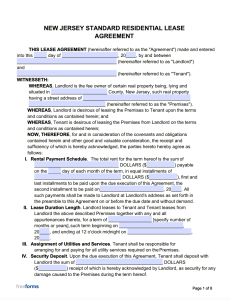 : Explicitly documents the specifics of leasing a residential unit.Download: PDF, Word (.docx) : Explicitly documents the specifics of leasing a residential unit.Download: PDF, Word (.docx) |
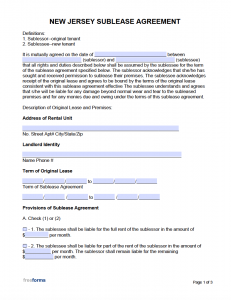 Sublease Agreement: Sets the rental provisions necessary allowing a person to participate or take over a lease accordingly. Sublease Agreement: Sets the rental provisions necessary allowing a person to participate or take over a lease accordingly.
Download: PDF, Word (.docx) |
Required Landlord Disclosures]
Identification of the Landlord or Authorized Personnel (§ 46-8-27 — 46-8-37) – Landlord identity law specifically requires that owner-occupied properties containing more than two units, or a property unoccupied by the owner must obtain a certificate of registration with the governing authorities.
Truth in Renting Act Information (§ 46-8-45) – A statement of the Department of Community Affairs Truth in Renting Act Information is to be given out at the time of lease endorsement.
Window Guard Notification (§ 5-10-27) – Homes to be leased to tenants with children age ten (10) or younger will obligate the landlord to provide and install window guards. All windows that can be opened and that are not designed to be utilized as access to a fire escape must be secured with permanent guards. It is required that prospective tenants either complete the provided New Jersey Window Guard Notification Form or include the following language in bold text in the lease agreement:
“Window Guard Notification:
The owner (landlord) is required by law to provide, install and maintain window guards in the apartment if a child or children 10 years of age or younger is, or will be, living in the apartment or is, or will be, regularly present there for a substantial period of time if the tenant gives the owner (landlord) a written request that the window guards be installed. The owner (landlord) is also required, upon the written request of the tenant, to provide, install and maintain window guards in the hallways to which persons in the tenant’s unit have access without having to go out of the building. If the building is a condominium, cooperative or mutual housing building, the owner (landlord) of the apartment is responsible for installing and maintaining window guards in the apartment and the association is responsible for installing and maintaining window guards in hallway windows. Window guards are only required to be provided in first-floor windows where the window sill is more than six feet above grade or there are other hazardous conditions that make installation of window guards necessary to protect the safety of children.”
Crime Insurance Information (§ 46-8-39) – Within thirty (30) days of occupancy, landlords must specifically inform tenants of the option to apply for Crime Insurance.
Lead-Based Paint (42 U.S. Code § 4852d) – A disclosure concerning the danger of lead-based paint in homes constructed before 1979.
Flood Zone (§ 46-8-50) – Residential properties that are positioned within an area designated as a “flood zone” require additional disclosure to the tenant.
When is Rent Due?
Grace Period: New Jersey depends on the lease to determine grace periods; however, the state mandates a 5-day grace period for renters who:
- Are senior citizens with certain pensions
- Are on social security disability or SSI
- Are (specifically) part of the Work First New Jersey initiative ((N.J.S.A. 2A:42-6.1), (N.J.S.A. 2A:42-6.3)).
Unpaid Rent: Once there is an unsuccessful demand for payment, landlords file a summary dispossess (eviction) complaint accordingly (NJ Rev Stat § 2A:18-53).
Late Fees
NSF Fee
Landlords send a demand for payment via certified mail, but after 35 days of nonpayment, landlords may pursue:
- The full check amount
- Attorney’s fees
- Damages that amount to the greater of $100 or 3x the check amount (N.J.S.A. 2A:32A-1).
Security Deposit Maximum ($)
New Jersey limits security deposits and any annual requirement accordingly:
- No more than 1.5 month’s rent for the initial security
- No more than %10 of the “current” deposit for annual security deposit (NJ Rev Stat § 46:8-21.2).
Security Deposit Return
Itemized List: The state staunchly requires that landlords give an itemized list of deductions whenever they are made for repairs (NJ RS § 46:8-21.1).
Landlord’s Right to Enter
Emergency Entry: The state expects New Jersey tenants to give immediate access to the property during emergencies (NJ AC 5:10-5.1).
Absence
Repair and Deduct
Tenant Breaking a Lease (Early):
Domestic Violence: In order to prematurely terminate the lease, victims must provide a statement that they believe they are in imminent danger as well as provide any of the following:
- Certified copy of a permanent restraining order
- Law enforcement agency records of domestic violence
- Medical documentation of the incident from a health care provider
- Documentation of the situation from a Domestic Violence Specialist or Agency
- Formal paperwork from a licensed social worker (N.J.S.A. 46:8-9.6).
Active Military: Military service members are under the protection of the federal government whenever they terminate a lease with 30 days notice to obey assignments and deployment (50 U.S.C. § 3955).
Landlord’s Noncompliance: Tenants may not abandon a property over noncompliance; they must seek to correct the problem through proper legal channels ((Reste Realty Corp. v. Cooper, 53 N.J. 444 (1969)).
Landlord’s Harassment: While the state does not specifically allow for early termination, it will enforce a tenant’s ability to leave as a response to a constructive eviction (Gottdiener v. Mailhot, 179 N.J. Super. 286 (App. Div. 1981)).
Inhabitability: Tenants must notify landlords of the issue; however, in serious, unsolvable situations, tenants terminate within a reasonable time of noncompliance (Reste Realty Corp. v. Cooper, 53 N.J. 444 (1969)).


